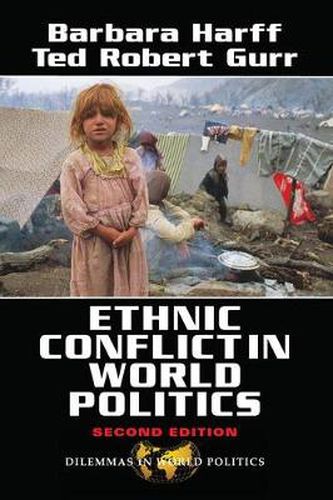Readings Newsletter
Become a Readings Member to make your shopping experience even easier.
Sign in or sign up for free!
You’re not far away from qualifying for FREE standard shipping within Australia
You’ve qualified for FREE standard shipping within Australia
The cart is loading…






This second edition of Ethnic Conflict in World Politics is an introduction to a new era in which civil society, states, and international actors attempt to channel ethnic challenges to world order and security into conventional politics. From Africa’s post-colonial rebellions in the 1960s and 1970s to anti-immigrant violence in the 1990s the authors survey the historical, geographic, and cultural diversity of ethno political conflict. Using an analytical model to elucidate four well-chosen case studies, the Kurds, the Miskitos, the Chinese in Malaysia, and the Turks in Germany, the authors give students tools for analysing emerging conflicts based on the demands of nationalists, indigenous peoples, and immigrant minorities throughout the world. The international community has begun to respond more quickly and constructively to these conflicts than it did to civil wars in divided Yugoslavia and genocide in Rwanda by using the emerging doctrines of proactive peace-making and peace enforcement that are detailed in this book. Concludes by identifying five principles of international doctrine for managing conflict in ethnically diverse societies. The text is illustrated with maps, tables, and figures.
$9.00 standard shipping within Australia
FREE standard shipping within Australia for orders over $100.00
Express & International shipping calculated at checkout
Stock availability can be subject to change without notice. We recommend calling the shop or contacting our online team to check availability of low stock items. Please see our Shopping Online page for more details.
This second edition of Ethnic Conflict in World Politics is an introduction to a new era in which civil society, states, and international actors attempt to channel ethnic challenges to world order and security into conventional politics. From Africa’s post-colonial rebellions in the 1960s and 1970s to anti-immigrant violence in the 1990s the authors survey the historical, geographic, and cultural diversity of ethno political conflict. Using an analytical model to elucidate four well-chosen case studies, the Kurds, the Miskitos, the Chinese in Malaysia, and the Turks in Germany, the authors give students tools for analysing emerging conflicts based on the demands of nationalists, indigenous peoples, and immigrant minorities throughout the world. The international community has begun to respond more quickly and constructively to these conflicts than it did to civil wars in divided Yugoslavia and genocide in Rwanda by using the emerging doctrines of proactive peace-making and peace enforcement that are detailed in this book. Concludes by identifying five principles of international doctrine for managing conflict in ethnically diverse societies. The text is illustrated with maps, tables, and figures.